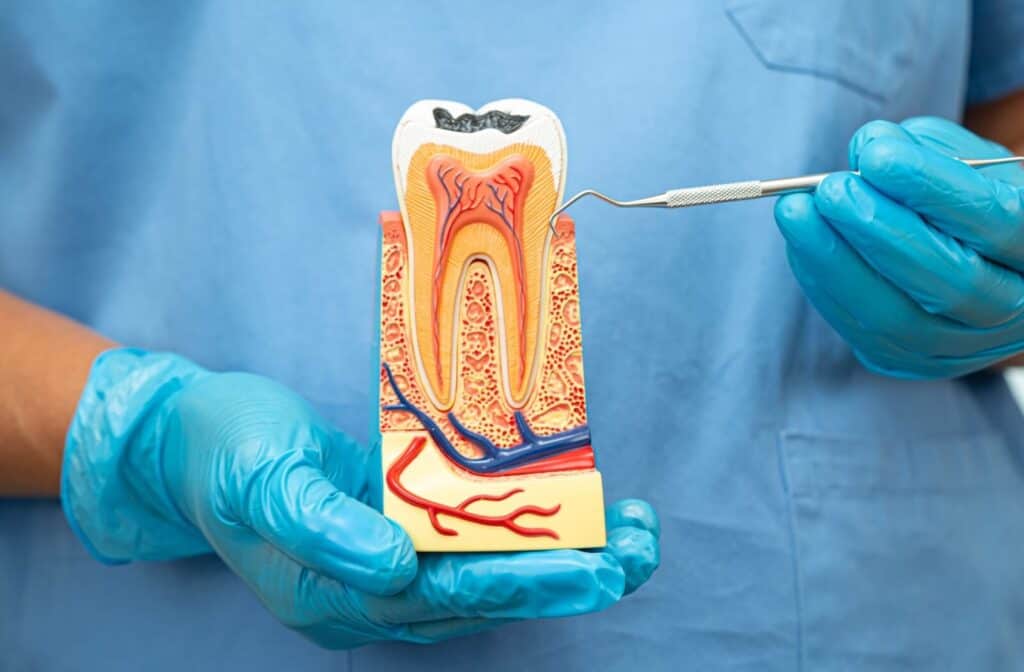7 Common Signs You Need a Root Canal
A root canal is not the most exciting reason to visit your dentist. But if you notice symptoms like pain, sensitivity to hot or cold, or swelling, you may need a root canal.
Symptoms like pain, swelling, loose teeth, sensitivity, and discoloration may indicate a serious problem with your teeth. So, get examined by a professional. If you have questions or concerns, contact us at South Ancaster Family Dental.
What is a Root Canal?
Also called endodontic therapy, a root canal is performed when the pulp (a chamber inside a tooth that contains blood vessels, nerves, and tissue) is inflamed or infected. Root canals can save an entire tooth from needing to be removed.
During a root canal, a dentist (or endodontist for more serious cases) removes the infected or inflamed pulp tissue. The procedure typically involves anesthesia, so you shouldn’t feel much pain. Serious pain and swelling are not common side effects after the procedure.
Common Signs a Root Canal May Be Needed
The following are symptoms of a condition that may require a root canal. You’re not guaranteed to need a root canal if you have one of these symptoms, but you should see a dentist right away as they may indicate a serious issue.
Pain
If you experience tooth pain—especially if it is persistent, intense, or spreads to your face or jaw—you may have an infection. Untreated tooth infections can have fatal consequences. Therefore, see a dentist as soon as possible if you have symptoms of one.
Discoloration
If your tooth’s color has changed from white to a darker shade, you may have an infected pulp. The infection impedes blood flow to the tooth, thereby making the tooth change color. The discoloration may also be caused by the deterioration of the tooth’s tissues and roots.
Swelling
An infection can cause swelling. Symptoms include swollen and tender gums or a swollen jaw. Pus from the infection may collect in your jaw and, unable to drain, cause the jaw to swell.
Pimples
You may also find pimples or boils on your gums if you have an infection. These bumps can ooze foul-smelling pus.
Sensitivity
If you feel pain in your teeth when you eat something hot or cold, you may need a root canal, especially if the pain continues after you stop eating.
Tooth sensitivity may also be a symptom of gum disease, so contact your dentist if your teeth feel sensitive. Treatment options for sensitive teeth include desensitizing toothpaste, bonding, and mouthguards, depending on the underlying cause.
Pain on Contact
If your tooth hurts when you touch it, that’s a sign that something is wrong. Pain on contact can mean that a tooth’s ligament at the tip of the root has become hypersensitive, which is a sign of severely damaged pulp. This is especially concerning if the pain continues even when you’re not touching the tooth.
Loose Teeth
Finally, if your tooth feels loose, you may need a root canal. This is because the pus from an infected tooth can damage the bones that anchor your teeth.
What Happens During a Root Canal

Root canals are routine procedures and, according to the Canadian Dental Association and Canadian Academy of Endodontics, are generally considered safe and effective. However, it’s understandable to be nervous about a root canal, so here’s what to expect if you’re scheduled for one:
Procedure
Typically, procedures will start with an initial consultation to help you understand what will happen. X-rays may be done to help diagnose the issue. Root canals are generally done in 1 or 2 appointments. How long each appointment takes will vary.
First, your dentist will give you a local anesthetic to minimize pain and discomfort. Next, they will place a rubber dam around the tooth to prevent saliva from entering the tooth.
The dentist will then open the tooth to access the root canal system. Using specialized tools, the dentist will clean out the pulp. After this is done, the canal is filled and sealed. The opening is also sealed with a filling. A crown may be necessary in some cases.
After the Procedure
Your dentist should tell you how to take care of your tooth as you recover from the procedure. You can expect your tooth to feel tender for a week or two, but serious pain and swelling are not normal. If you experience this, contact your dentist.
Remember to take care of your teeth. A root canal will not prevent further cavities or gum disease, so be sure to keep brushing and flossing!
Sometimes, retreatment (another root canal) is required. But this is rare.
Root Canal Treatment at South Ancaster Family Dental
Our team at South Ancaster Family Dental strives to provide patients with a comfortable and compassionate environment. We enjoy discussing options with our patients to find a treatment plan that suits their unique needs. A root canal can help alleviate pain and may even save you from a tooth extraction. Contact us today to learn more or to book an appointment.

